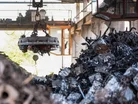Steel Recycling 'can Counter Coal & Iron Mining Carbon Cost'

The ferrous metals recycling market is projected to grow significantly in the years leading up to 2030, reducing the need for carbon heavy industrial practises including iron ore and metallurgical coal mining and traditional steelmaking.
Ferrous metals are those that contain iron, and are known for their strength, durability and magnetic properties. Iron ore is mined from open pits on all continents except Antarctica. The largest producers are China and Australia, with China producing 44% of the world's iron ore.
The iron and steel sector emits around 2.6 gigatonnes (Gt) of carbon dioxide (CO2) annually, which is 7% of the world's total energy system emissions. This is the highest amount of emissions among heavy industries.
Coal & iron ore mining makes new steel carbon heavy
One reason steel is so carbon intensive is that it requires the use of steam coal -- also known as thermal coal, metallurgical coal and coking coal -- to fuel the blast furnaces that are needed to provide both the necessary heat and carbon to turn iron ore into steel. This method is used to produce about 70% of the world’s 1.8 billion tons of steel each year.
This is why the demand for metallurgical coal is coupled to the demand for steel, and why most primary steelmakers have a division that produces coal for coking, to ensure a stable and low-cost supply.
Steel is especially crucial to the construction industry, where it is used for structural frameworks and reinforcement bars. In 2022, the building and infrastructure segment accounted for 52% of the steel produced worldwide, compared to the automotive industry (12%) and electrical equipment (3%).
This makes ferrous metals recycling crucial, because it conserves natural resources, reduces energy consumption and minimises greenhouse gas emissions compared to producing new metals. Encouragingly, the recycling market is projected to increase from US$551.9bn in 2024 to US$767.9bn by 2029.
Iron & steel recycling: the main players
Recycling ferrous metals involves collecting scrap from construction and demolition sites, as well as from the automotive and manufacturing sectors.
The ferrous metals recycling key players include:
- ArcelorMittal (Luxembourg)
- Nucor (US)
- CMC (US)
- Sims Limited (Australia)
- Aurubis AG (Germany)
- Dowa Holdings (Japan)
- Tata Steel (India)
- Radius Recycling (US)
- European Metal Recycling (UK)
These efforts support the circular economy and fuel the demand for recycled metals, encouraging advancements in recycling processes and technologies.
T.V. Narendran, CEO and Managing Director of Tata Steel, states: "As the automotive industry shifts towards electric vehicles, the demand for high-quality recycled steel becomes crucial.
"Tata Steel is committed to providing sustainable steel solutions that reduce environmental impact and support the circular economy."
Ferrous metals recycling market in Europe
The projection is that Europe will be the second-largest region in terms of ferrous metals recycling value in the coming years. Several factors are driving this market:
- Stringent environmental regulations: EU policies aim to reduce waste and promote recycling through directives on waste management and recycling targets
- Sustainability and circular economy: Growing environmental awareness among businesses and consumers boosts demand for recycled metals
- Technological advancements: Improved recycling technologies enhance efficiency, making it easier to recover high-quality metals from scrap
- Industrial and manufacturing sectors: Robust industries generate substantial metal scrap, recycled into new products
- Economic benefits: Recycling metals is often more cost-effective than mining and processing new ores, providing financial incentives for businesses.
Overall, the combination of strict regulations, a focus on sustainability, technological advancements, industrial demand and economic benefits drives the metal recycling market in Europe.
A recent report from The Global Scrap Metal Recycling Market showed that, while recycling may take some time to impact the mining sector, it's a factor that investors should consider when planning for the long term.
The report stressed that metals recycling is essential because it minimises the need to extract metals.
It also points out that recycled metal is a cheaper and easier source for manufacturers and producers, which saves the cost of mining for virgin raw materials and also cuts the cost of production.
This is especially important in the construction sector, which has notoriously low profit margins, largely due to the competitive bidding model that leaves very little margin for overspend on projects due to time delays and increased costs for labour, materials and equipment.
________________________________
Check out the latest issue of Mining Digital and sign up to our global conference series, Manufacturing LIVE 2024. Mining Digital is a BizClik brand.
